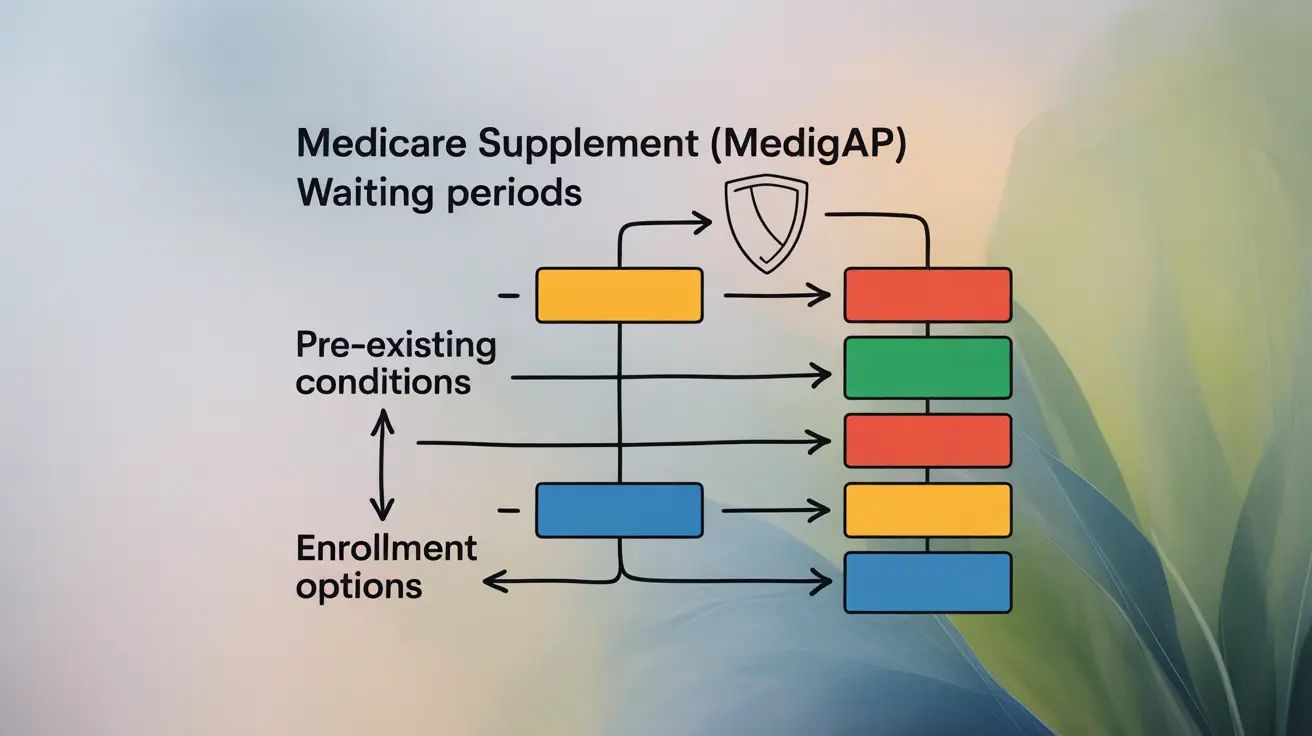Understanding Medicare Supplement (Medigap) insurance waiting periods for pre-existing conditions is crucial for anyone considering or switching these policies. These waiting periods can significantly impact when your coverage begins and how much you'll need to pay out of pocket for certain conditions.
This comprehensive guide will explain everything you need to know about Medigap waiting periods, including maximum durations, exceptions, and how to protect yourself from coverage gaps.
Understanding Pre-existing Condition Waiting Periods in Medigap Policies
A pre-existing condition waiting period is a duration during which a Medigap insurance company can delay coverage for health conditions you had before your policy started. Federal law limits how long these waiting periods can last, protecting consumers from excessive delays in coverage.
The waiting period for a pre-existing condition under a Medicare Supplement policy may not extend beyond six months. During this time, you would be responsible for out-of-pocket costs related to your pre-existing condition, while other health conditions would still be covered by your Medigap policy.
Exceptions to Pre-existing Condition Waiting Periods
Creditable Coverage Protection
If you had continuous health insurance coverage for at least six months before enrolling in a Medigap policy, you may be exempt from the pre-existing condition waiting period. This previous insurance is called "creditable coverage," and it can help you avoid gaps in your healthcare coverage.
Guaranteed Issue Rights
During your Medigap Open Enrollment Period or if you have guaranteed issue rights, insurance companies cannot impose waiting periods for pre-existing conditions. This protection ensures immediate coverage for all your health conditions.
State-Specific Regulations
Some states have implemented additional consumer protections regarding pre-existing condition waiting periods. These states may:
- Prohibit waiting periods entirely
- Reduce the maximum waiting period length
- Expand the definition of creditable coverage
- Provide additional guaranteed issue rights
It's important to check with your state's insurance department to understand the specific regulations that apply to your situation.
Switching Medigap Policies
When changing from one Medigap policy to another, you may face new waiting periods for pre-existing conditions. However, this depends on several factors:
- Whether you're within your Open Enrollment Period
- If you have guaranteed issue rights
- Your previous coverage history
- State-specific regulations
Frequently Asked Questions
What is the maximum waiting period for coverage of a pre-existing condition under a Medicare Supplement (Medigap) policy? The maximum waiting period is six months. After this period, your pre-existing conditions must be fully covered under your Medigap policy.
Can a Medigap plan impose a waiting period for pre-existing conditions if I had at least six months of prior creditable coverage? No, if you had continuous creditable coverage for at least six months before enrolling in a Medigap policy, the insurance company cannot impose a pre-existing condition waiting period.
How does the Medigap open enrollment period protect me from waiting periods or denial due to pre-existing conditions? During your Medigap Open Enrollment Period, insurance companies cannot impose waiting periods for pre-existing conditions or deny you coverage based on your health status.
Are there any states where Medigap policies do not allow a waiting period for pre-existing conditions? Yes, some states have regulations that prohibit or limit pre-existing condition waiting periods. Contact your state's insurance department for specific information about local regulations.
What happens if I switch from one Medigap policy to another—can a new waiting period be applied to my pre-existing conditions? When switching Medigap policies, you may face new waiting periods unless you're in your Open Enrollment Period, have guaranteed issue rights, or are protected by state regulations.
Understanding your rights and options regarding pre-existing condition waiting periods can help you make informed decisions about your Medicare Supplement insurance coverage. Always consult with a licensed insurance agent or your State Health Insurance Assistance Program (SHIP) for guidance specific to your situation.




